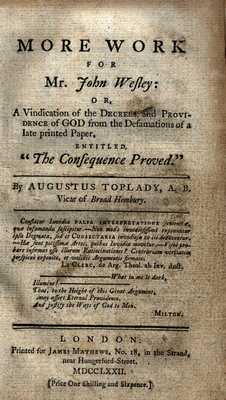|
Following John Wesley's misattributed translation "The Doctrine of Absolute Predestination stated and asserted, by The Reverend Mr A_ T_" of "The Doctrine of Absolute Predestination stated and asserted; with a preliminary Discourse on the Divine Attributes; translated in great measure from the Latin of Jerom Zanchius." Toplady immediatly wrote "A Letter to the Rev. Mr. John Wesley relative to his pretended Abridgment of Zanchius on Predestination" on 26th March 1770, Wesleys 1771 response "The Consequence Proved" was failed to satisfy Toplady as in particular there was no acknowledgement that Wesley had acted improperly in any way. Toplady's final work on the subject (More Work for Mr. John Wesley) was published in 1772, the adverstisment for which reads:
I Expect, that this publication will, as usual, be followed by a succession of penny and two-penny squibs. Probably, I shall take no notice of them. Mr. Wesley, it seems, has between two and three hundred lay-preachers in his connection. Their name is legion, for they are many. It is impossible, therefore, from their multitude, that they and their leader should not have the last word, if they are so determined. The latter has lately declared, in print, that he has been "fighting about words, for almost these thirty years." Doubtless, therefore, the last word must, in his estimation, be particulary worth fighting for. And (unless he should publish anything at all to the purpose) the last word he is welcome to have. A man would have an hopeful task of it, who should waste his free-time in play at see-saw with almost three hundred such wise and genteel antagonists,
"Who then talk most, when least they have to say:"
And some of whom have already shewn themselves not worthy of even being pilloried in a preface, or gagged at a pamphlet's end.
To those who know me not, it may seem needful to declare, that as much as I disapprove of Wesley's distinguishing principles, and the new cunning with which he circulates them; I will bear not the least ill-will to his person. As an individual, I wish him well, both here and after. As a reviler, he lies (in a way of argument) in the mercy of those he defames. I make, however, no scruple to acknowledge, that the manuscript of the following sheets has lain by me, some weeks, merely with a view of striking out, from time to time, whatever might favour of undue asperity and intemperate warmth. If I any where, however, express myself strongly, it is owing to the necessity I was under of exposing Mr. Wesley's unmanly and dishonest methods of attack.
Broad Hembury,
Nov. 28, 1771.
The closing comments reveal the reasons why Wesleys arminianism is so odious:
One word, to Mr. Wesley himself, and I have done. Time, sir, (I am informed) has already whitened your locks: and the hour must shortly come, which will transmit you to the tribunal of that God, on whose sovereignty, a great part of your life has been one continued assault. At that bar, I too must hold up my hand. Omniscience only can tell, which of us shall first appear before the Judge of all. I shortly may. You shortly must. The part, you have been permitted to act in the religious world, will sooner or later, sit heavy on your mind. “Mixed in the warm converse of life, we think with men: on a death-bed with God. Depend upon it, a period will arrive, when the Father's election mercy, and the Messiah's adorable righteousness, will appear, in your eyes, even in your's, to be the only safe anchorage for a dying sinner. I mean, unless you are actually given over to final obduration. Which, I trust, you are not; and to which, I most ardently beseech God you never may.
You have told us, tolidem verbis, that “Men's believing is the cause of their justification: that “our obeying Christ is the cause of his giving us eternal life:” and that “our obedience to Christ is the cause of his becoming the author of eternal salvation to us.” You have affirmed, speaking of God, that it can never “consist with his unerring wisdom, to think that I am innocent, to judge that I am righteous, because another is so. He can no more, in this manner, confound me with Christ, than with David or Abraham.”Such doctrine may pass well enough, while life and health last: but it will leave us comfortless, hopeless, ruined, in that hour, when heart and flesh fail. Woe be to you, to me, and to all the race of Adam, if the righteousness of Christ will not then stand us any more stead, than the righteousness of David or Abraham! was that really to be the case, how could Mr. Wesley, in particular, hope for justification at the hand of that God, whom he has impiously compared to “Tiberius” and “the Grand Turk?”
|
|
